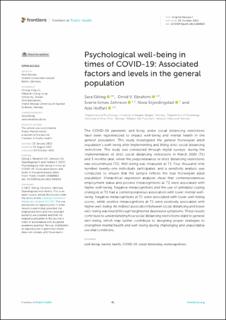Psychological well-being in times of COVID-19: Associated factors and levels in the general population
Nordbø, Sara Ebling; Ebrahimi, Omid Vakili; Johnson, Sverre Urnes; Skjerdingstad, Nora; Hoffart, Asle
Journal article, Peer reviewed
Published version

Åpne
Permanent lenke
https://hdl.handle.net/11250/3058821Utgivelsesdato
2022Metadata
Vis full innførselSamlinger
- Faculty of Psychology [527]
- Registrations from Cristin [9791]
Sammendrag
The COVID-19 pandemic and living under social distancing restrictions have been hypothesized to impact well-being and mental health in the general population. This study investigated the general Norwegian adult population's well-being after implementing and lifting strict social distancing restrictions. The study was conducted through digital surveys; during the implementation of strict social distancing restrictions in March 2020 (T1) and 3 months later, when the preponderance of strict distancing restrictions was discontinued (T2). Well-being was measured at T2. Four thousand nine hundred twenty-one individuals participated, and a sensitivity analysis was conducted to ensure that the sample reflects the true Norwegian adult population. Hierarchical regression analyses show that contemporaneous employment status and positive metacognitions at T2 were associated with higher well-being. Negative metacognitions and the use of unhelpful coping strategies at T2 had a contemporaneous association with lower mental well-being. Negative metacognitions at T1 were associated with lower well-being scores, while positive metacognitions at T1 were positively associated with higher well-being. An indirect association between social distancing and lower well-being was found through heightened depressive symptoms. These results contribute to understanding how social distancing restrictions relate to general well-being, which may further contribute to designing proper strategies to strengthen mental health and well-being during challenging and unavoidable societal conditions.
